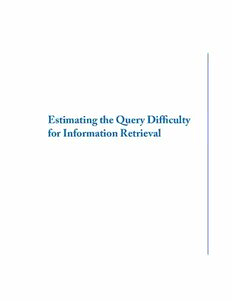Table Of ContentEstimating the Query Difficulty
for Information Retrieval
Copyright© 2010byMorgan&Claypool
Allrightsreserved.Nopartofthispublicationmaybereproduced,storedinaretrievalsystem,ortransmittedin
anyformorbyanymeans—electronic,mechanical,photocopy,recording,oranyotherexceptforbriefquotationsin
printedreviews,withoutthepriorpermissionofthepublisher.
EstimatingtheQueryDifficultyforInformationRetrieval
DavidCarmelandEladYom-Tov
www.morganclaypool.com
ISBN:9781608453573 paperback
ISBN:9781608453580 ebook
DOI10.2200/S00235ED1V01Y201004ICR015
APublicationintheMorgan&ClaypoolPublishersseries
SYNTHESISLECTURESONINFORMATIONCONCEPTS,RETRIEVAL,ANDSERVICES
Lecture#15
SeriesEditor:GaryMarchionini,UniversityofNorthCarolina,ChapelHill
SeriesISSN
SynthesisLecturesonInformationConcepts,Retrieval,andServices
Print1947-945X Electronic1947-9468
Synthesis Lectures on
Information Concepts,
Retrieval, and Services
Editor
GaryMarchionini,UniversityofNorthCarolina,ChapelHill
SynthesisLecturesonInformationConcepts,Retrieval,andServicesiseditedbyGary
MarchioninioftheUniversityofNorthCarolina.Theserieswillpublish50-to100-page
publicationsontopicspertainingtoinformationscienceandapplicationsoftechnologyto
informationdiscovery,production,distribution,andmanagement.Thescopewilllargelyfollowthe
purviewofpremierinformationandcomputerscienceconferences,suchasASIST,ACMSIGIR,
ACM/IEEEJCDL,andACMCIKM.Potentialtopicsinclude,butnotarelimitedto:datamodels,
indexingtheoryandalgorithms,classification,informationarchitecture,informationeconomics,
privacyandidentity,scholarlycommunication,bibliometricsandwebometrics,personal
informationmanagement,humaninformationbehavior,digitallibraries,archivesand
preservation,culturalinformatics,informationretrievalevaluation,datafusion,relevance
feedback,recommendationsystems,questionanswering,naturallanguageprocessingforretrieval,
textsummarization,multimediaretrieval,multilingualretrieval,andexploratorysearch.
EstimatingtheQueryDifficultyforInformationRetrieval
DavidCarmelandEladYom-Tov
2010
iRODSPrimer:IntegratedRule-OrientedDataSystem
ArcotRajasekar,ReaganMoore,Chien-YiHou,ChristopherA.Lee,RichardMarciano,Antoinede
Torcy,MichaelWan,WayneSchroeder,Sheau-YenChen,LucasGilbert,PaulTooby,andBingZhu
2010
CollaborativeWebSearch:Who,What,Where,When,andWhy
MeredithRingelMorrisandJaimeTeevan
2009
MultimediaInformationRetrieval
StefanRüger
2009
iv
OnlineMultiplayerGames
WilliamSimsBainbridge
2009
InformationArchitecture:TheDesignandIntegrationofInformationSpaces
WeiDingandXiaLin
2009
ReadingandWritingtheElectronicBook
CatherineC.Marshall
2009
HypermediaGenes:AnEvolutionaryPerspectiveonConcepts,Models,andArchitectures
NunoM.GuimarãesandLuísM.Carrico
2009
UnderstandingUser-WebInteractionsviaWebAnalytics
BernardJ.(Jim)Jansen
2009
XMLRetrieval
MouniaLalmas
2009
FacetedSearch
DanielTunkelang
2009
IntroductiontoWebometrics:QuantitativeWebResearchfortheSocialSciences
MichaelThelwall
2009
ExploratorySearch:BeyondtheQuery-ResponseParadigm
RyenW.WhiteandResaA.Roth
2009
NewConceptsinDigitalReference
R.DavidLankes
2009
AutomatedMetadatainMultimediaInformationSystems:Creation,Refinement,Usein
Surrogates,andEvaluation
MichaelG.Christel
2009
Estimating the Query Difficulty
for Information Retrieval
David Carmel and EladYom-Tov
IBMResearch,Israel
SYNTHESISLECTURESONINFORMATIONCONCEPTS,RETRIEVAL,AND
SERVICES#15
M
&C Morgan &cLaypool publishers
ABSTRACT
Many information retrieval (IR) systems suffer from a radical variance in performance when re-
spondingtousers’queries.Evenforsystemsthatsucceedverywellonaverage,thequalityofresults
returnedforsomeofthequeriesispoor.Thus,itisdesirablethatIRsystemswillbeabletoidentify
"difficult"queriessotheycanbehandledproperly.Understandingwhysomequeriesareinherently
moredifficultthanothersisessentialforIR,andagoodanswertothisimportantquestionwillhelp
searchenginestoreducethevarianceinperformance,hencebetterservicingtheircustomerneeds.
Estimatingthequerydifficultyisanattempttoquantifythequalityofsearchresultsretrieved
foraqueryfromagivencollectionofdocuments.Thisbookdiscussesthereasonsthatcausesearch
enginestofailforsomeofthequeries,andthenreviewsrecentapproachesforestimatingquerydif-
ficultyintheIRfield.Itthendescribesacommonmethodologyforevaluatingthepredictionquality
of those estimators, and experiments with some of the predictors applied by various IR methods
over several TREC benchmarks. Finally, it discusses potential applications that can utilize query
difficulty estimators by handling each query individually and selectively,based upon its estimated
difficulty.
KEYWORDS
informationretrieval,retrievalrobustness,querydifficultyestimation,performancepre-
diction
vii
Contents
Acknowledgments...........................................................xi
1 Introduction-TheRobustnessProblemofInformationRetrieval...............1
1.1 Reasonsforretrievalfailures-theRIAworkshop..............................3
1.2 Instabilityinretrieval-theTREC’sRobusttracks.............................4
1.3 Estimatingthequerydifficulty...............................................6
1.4 Summary..................................................................7
2 BasicConcepts...............................................................9
2.1 Theretrievaltask...........................................................9
2.2 Thepredictiontask........................................................10
2.2.1 Linearcorrelation 10
2.2.2 Rankcorrelation 12
2.3 Predictionrobustness......................................................12
2.4 Summary.................................................................13
3 QueryPerformancePredictionMethods......................................15
4 Pre-RetrievalPredictionMethods............................................17
4.1 Linguisticapproaches......................................................17
4.2 Statisticalapproaches......................................................19
4.2.1 Definitions 19
4.2.2 Specificity 20
4.2.3 Similarity 21
4.2.4 Coherency 21
4.2.5 Termrelatedness 22
4.3 Evaluatingpre-retrievalmethods............................................22
viii
4.4 Summary.................................................................24
5 Post-RetrievalPredictionMethods...........................................25
5.1 Clarity ...................................................................26
5.1.1 Definition 26
5.1.2 Examples 27
5.1.3 OtherClarity measures 28
5.2 Robustness................................................................29
5.2.1 Queryperturbation 29
5.2.2 Documentperturbation 30
5.2.3 Retrievalperturbation 31
5.2.4 Cohesion 31
5.3 Scoredistributionanalysis..................................................32
5.4 Evaluatingpost-retrievalmethods...........................................35
5.5 Predictionsensitivity.......................................................36
5.6 Summary.................................................................36
6 CombiningPredictors.......................................................39
6.1 Linearregression..........................................................39
6.2 Combiningpre-retrievalpredictors..........................................39
6.3 Combiningpost-retrievalpredictors.........................................40
6.3.1 Combiningpredictorsbasedonstatisticaldecisiontheory 41
6.3.2 EvaluatingtheUEF framework 42
6.3.3 Results 43
6.3.4 CombiningpredictorsintheUEF model 44
6.4 Summary.................................................................45
7 AGeneralModelforQueryDifficulty........................................47
7.1 Geometricalillustration....................................................47
7.2 Generalmodel............................................................48
7.3 Validatingthegeneralmodel................................................50
7.4 Therelationshipbetweenaspectcoverageandquerydifficulty..................51
CONTENTS ix
7.5 Validatingtherelationshipbetweenaspectcoverageandquerydifficulty.........52
7.6 Summary.................................................................53
8 ApplicationsofQueryDifficultyEstimation..................................55
8.1 Feedback:Totheuserandtothesystem .....................................55
8.2 Federationandmetasearch .................................................56
8.3 Contentenhancementusingmissingcontentanalysis .........................58
8.4 Selectivequeryexpansion .................................................. 60
8.4.1 Selectiveexpansionbasedonquerydriftestimation 61
8.4.2 Adaptiveuseofpseudorelevancefeedback 61
8.5 Otherusesofquerydifficultyprediction.....................................62
8.6 Summary.................................................................63
9 SummaryandConclusions...................................................65
9.1 Summary.................................................................65
9.2 Whatnext?...............................................................67
9.3 Concludingremarks.......................................................68
Bibliography................................................................69
Authors’Biographies........................................................77

